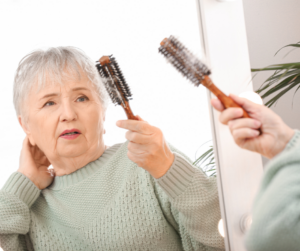Does Your Mom Have Alopecia?
 Alopecia is a condition that affects many seniors. Senior women are more likely than men to develop alopecia because their shifting hormones can lead to an increased risk of hair loss.
Alopecia is a condition that affects many seniors. Senior women are more likely than men to develop alopecia because their shifting hormones can lead to an increased risk of hair loss.
Alopecia is typically caused by:
- Family history of baldness or hair loss
- Aging
- Medical conditions
- Medications
- Nutritional deficiencies
- And other factors
Many women first notice the symptoms of alopecia when they are washing their hair. If your mom has trouble showering or washing her hair she may need personal care at home. Personal care at home is specialty care for seniors that will help seniors who are living independently with hygiene tasks like showering or washing their hair.
Your mom may notice that her hair is thinning but think it’s just due to normal aging. If you notice that your mom has any of these symptoms of alopecia you should schedule a screening with a doctor to see if she has alopecia:
Gradual Thinning on the Top of the Head
This is the most common type of hair loss, known as androgenetic alopecia or female-pattern baldness. It often starts with thinning at the part line and can progress to wider thinning across the crown. This can be hormonal hair thinning, but it should be checked by a doctor to be sure. Hormone therapy may help reverse hair loss if it’s caused by a hormonal imbalance.
If there is a history of baldness in the family among the men or women that increases the risk that your mom could have alopecia.
Patchy Bald Spots
Some women may experience alopecia areata, which presents as sudden, circular bald patches that can overlap and create larger bald areas. Your mom may not be able to see small bald spots if they are on the back of her head or the sides of her head. Check for her, and if your see any small bald patchy spots make an appointment for her with a doctor.
Overall Hair Thinning
A general reduction in hair volume and density, which can be more diffuse rather than concentrated in specific areas, is common in age-related hair loss. If your mom has chopped her hair short to try and stop the problem but there is still a lot of thinning she could have alopecia.
Sudden Hair Loss
A rapid shedding of hair, known as telogen effluvium, can occur due to stress, illness, or major life changes. This often results in noticeable thinning over a short period. Sudden hair loss could also indicate other medical problems and should be checked out right away.
Receding Hairline
Some women may experience a receding hairline, similar to male-pattern baldness, although this is less common in women.
Brittle or Easily Broken Hair
Your mom’s hair may become more brittle, dry, and prone to breaking, which can exacerbate the appearance of thinning if your mom is noticing a lot of hair in her brush after brushing her hair that’s not normal hair thinning.
Itching or Scalp Discomfort
Some types of alopecia can be accompanied by itching, tenderness, or a sensation of discomfort on the scalp. She may also develop small scaly, thick, or red patches on her scalp and on the top of her head.
